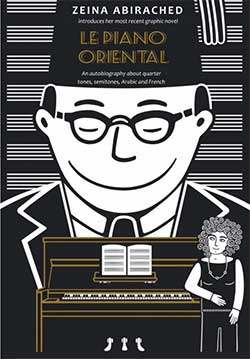
From her earliest days, Franco-Arabic writer Zeina Abirached has heard stories of violence and loss.
“My generation inherited a Beirut that was destroyed, but we also inherited stories of a lost paradise.”
But Abirached is also an expert on moving between cultures. She is a drogman, to use the ancient Arabic word at the heart of her new book, an interpreter who creates beautiful links between France and other parts of the Arab world, as she showed during an appearance at Duke Wednesday evening.
Born in Beirut, Lebanon, amid the civil war, Abirached documents her life through her graphic novels, including “Catharsis” and “Le Jeu des hirondelles,” recently translated as “A Game for Swallows, To Die, to Leave, to Return.” Taking biographical elements and blending them with a reflection on identity and language, she captures her experiences in war-torn Beirut and her choice of living in Paris, France.
Abirached’s texts feature her signature black-and-white drawings, which has significant symbolic meaning, she told the audience.
“I use black-and-white because it’s practical,” Abirached said. “I can express a lot of emotions without actually drawing anything. In the same way, in a graphic novel, you can say a lot with only a few drawings.”
Her novels emphasize events she feels are too important to forget, she said.
“In Beirut, we never talk about the civil war,” she said. “Even in history textbooks, we stop after the 1960s. We are really living an amnesia, but it’s important to remember.”
She arrived on campus following an bombing attack that killed more than 40 people in Beirut, the day prior to the attacks in Paris. ISIS has claimed responsibility for both.
Her latest book, “Le Piano oriental,” was inspired by a special piano made by her great-grandfather. Abdallah Kamanja built a bilingual instrument, one that could play both occidental and oriental music. The unusual instrument has an extra pedal that shifts the hammers inside the piano, altering the quarter tones and semitones. (Abirached had come to Duke in 2013 and read from the work in progress.)
“The entire book is about sounds,” Abirached said. “I wanted the readers to feel as if they were reading a musical score.”
The main character in the novel tunes into the sounds all around him - the noise of the city, the squeak of his new leather shoes, the rhythmic syncopation that he makes by tapping on his hat. The invented melodies all converge in the bilingual piano. The sound imagery and metaphor express Abirached’s sense of belonging to and contributing to French and Arabic cultures.
“I noticed how those two languages were closely linked in my head,” she said. “I imagined like I was using them to knit a beautiful scarf.”
For many in the audience, the music in this writer’s book – and her own voice -- resonated as a powerful response to the attacks this week on the Bataclan, the Parisian club.
Abirached’s visit was sponsored by the Departments of Romance Studies; Music; Art, Art History and Visual Studies; Asian and Middle Eastern Studies; the Center for French and Francophone Studies; the French Language Program; the Trinity College Language Committee.